Texas Policy & Politics 2022
With a polarized electorate, high profile Supreme Court decisions, border concerns, energy reliability and other hot button issues in the forefront, the 2022 Texas general election is sure to be a lively one. This November, Texas voters will make vote decisions in races for governor and other statewide positions. Who are the frontrunners? What policy issues are at the top of the list when making decisions about gubernatorial candidates? What do Texans think the state government should do in issues related to abortion in a post-Roe America? To answer these questions and more, the Hobby School of Public Affairs at the University of Houston conducted an online survey of Texas registered voters to identify their preferences and opinions regarding the 2022 general election candidates and abortion policy. The survey was fielded between June 27 and July 7, 2022, in English and Spanish, with 1,169 YouGov respondents who are registered to vote in Texas, resulting in a confidence interval of +/-2.9%. The respondents were matched to a sampling frame on gender, age, race/ethnicity, presidential vote history and education and are representative of the population of Texas registered voters. The survey went into the field three days after the U.S. Supreme Court released its decision in Dobbs v. Jackson overruling Roe v. Wade (1973) and Planned Parenthood v. Casey (1992), the two U.S. Supreme Court decisions that had governed abortion policy in the United States over the last half century.
The results of the survey are presented in a series of three reports. The first report examines the vote intention of Texans for the 2022 Texas gubernatorial, lieutenant governor and attorney general elections as well as analyzes the influence of a wide range of issues on Texas voters’ gubernatorial vote decision along with favorability ratings of statewide candidates. The second report looks at the vote intention of Harris County residents for the 2022 county judge election as well as analyzes the influence of a wide range of issues on Harris County voters’ county judge vote decision. It also assesses name recognition and favorability ratings of Harris County candidates and elected officials. The final report explores Texans’ opinions about abortion policy and related legislative proposals.
Report One. Texas Policy & Politics 2022: Candidates, Issues & Favorability
Highlights
In the race for governor, Republican Greg Abbott (49%) leads Democrat Beto O’Rourke (44%) by 5% among likely voters, with 5% undecided and 2% intending to vote for Libertarian Mark Tippetts.
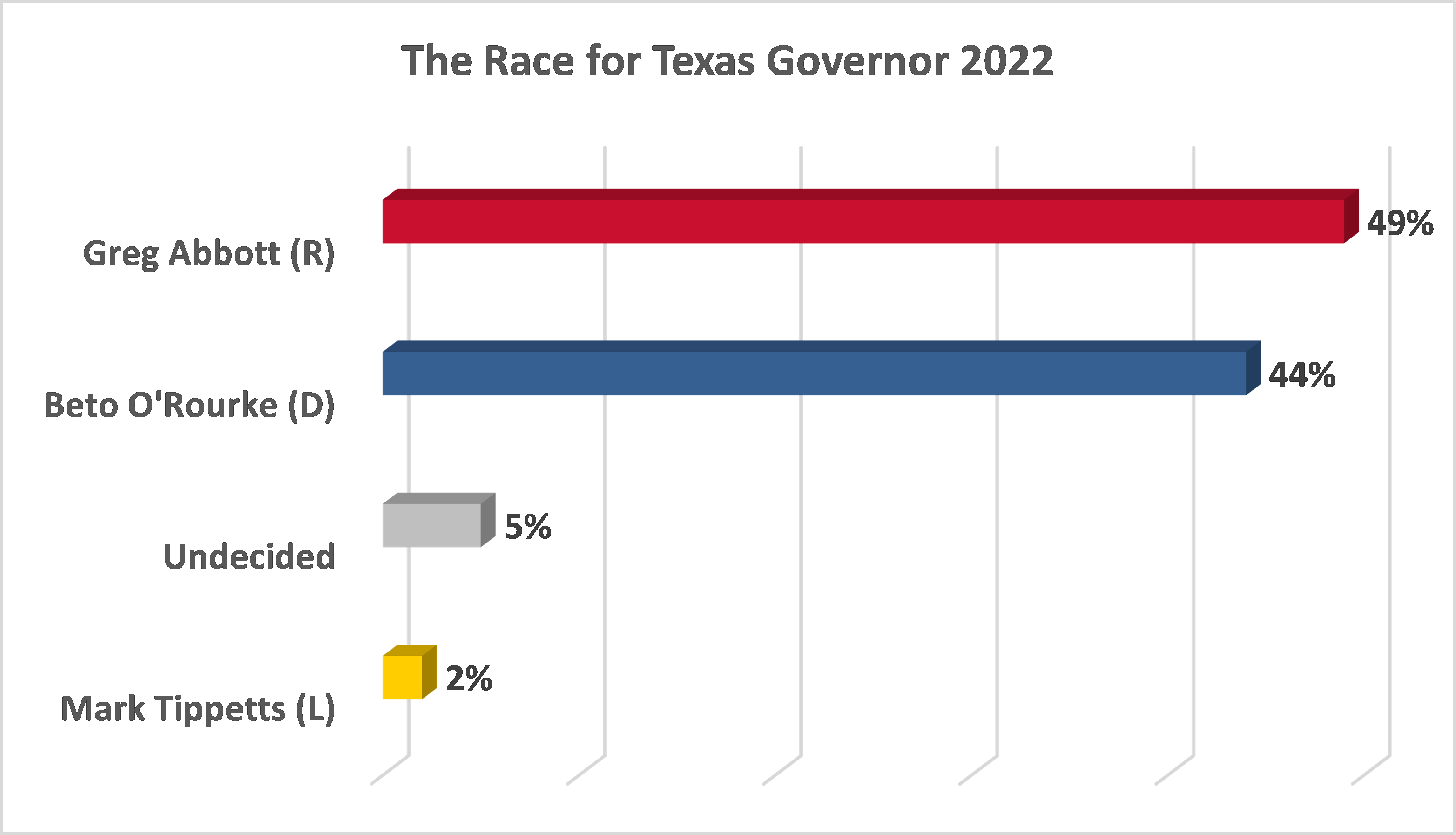
Abbott holds a 27% (60% to 33%) lead over O’Rourke among white voters while O’Rourke holds a 72% (80% to 8%) lead over Abbott among Black voters and a 9% (51% to 42%) lead among Latino voters.
O’Rourke has a 6% (49% to 43%) lead over Abbott among women, while Abbott enjoys a 18% (56% to 38%) lead over O’Rourke among men.
Older Texans belonging to the Silent Generation/Baby Boomer cohort and to Generation X favor Abbott over O’Rourke by margins of 18% (57% to 39%) and 9% (52% to 43%) respectively, while O’Rourke is the candidate of choice among younger Texans belonging to the Millennial/Generation Z cohort, with a 15% (51% to 36%) advantage over Abbott.
When asked to what extent 15 issues would be important to their gubernatorial vote choice, more than three-fourths of Texas likely voters listed these five policies as being extremely or very important: inflation (84%), crime & public safety (83%), government spending and taxes (78%), economic growth (78%) and health care costs (76%).
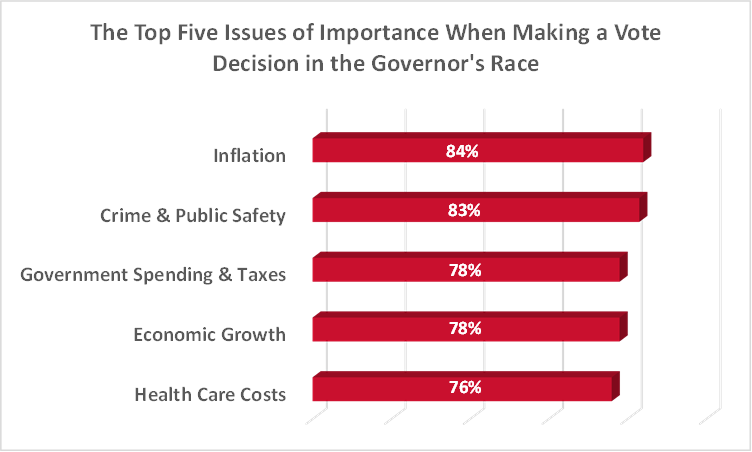
In the race for lieutenant governor, Republican Dan Patrick leads Democrat Mike Collier by 5% among likely voters, 48% to 43%, with 9% undecided.
In the race for attorney general, Republican Ken Paxton leads Democrat Rochelle Mercedes Garza by 5% among likely voters (46% to 41%), with 9% undecided and 4% intending to vote for Libertarian Mark Ash.
Among Texas registered voters, Greg Abbott is viewed favorably by 49% and unfavorably by 47%; Donald Trump is viewed favorably by 48% and unfavorably by 51%, while Ted Cruz is viewed favorably by 47% and unfavorably by 49%.
Among the best known political figures, the Republican with the lowest proportion of Texas registered voters holding a favorable opinion of them is John Cornyn (28%).
Among Texas registered voters, Beto O’Rourke is viewed favorably by 44% and unfavorably by 49%, while Joe Biden is viewed favorably by 41% and unfavorably by 58%.
Read the report.
Media Release, July 13, 2022
Report Two. Texas Policy & Politics 2022: Harris County
The survey questions posed to 321 registered voters in Harris County were conducted simultaneously with the statewide survey fielded between June 27 and July 7, 2022 in English and Spanish, with a confidence interval of +/-5.47%. The respondents were matched to a sampling frame on gender, age, race/ethnicity, presidential vote history, and education and are representative of the population of Harris County registered voters.
Highlights
Among likely voters in Harris County, Democrat Lina Hidalgo (48%) holds a 1% lead over Republican Alexandra del Moral Mealer (47%) in the race for county judge, with 5% undecided.
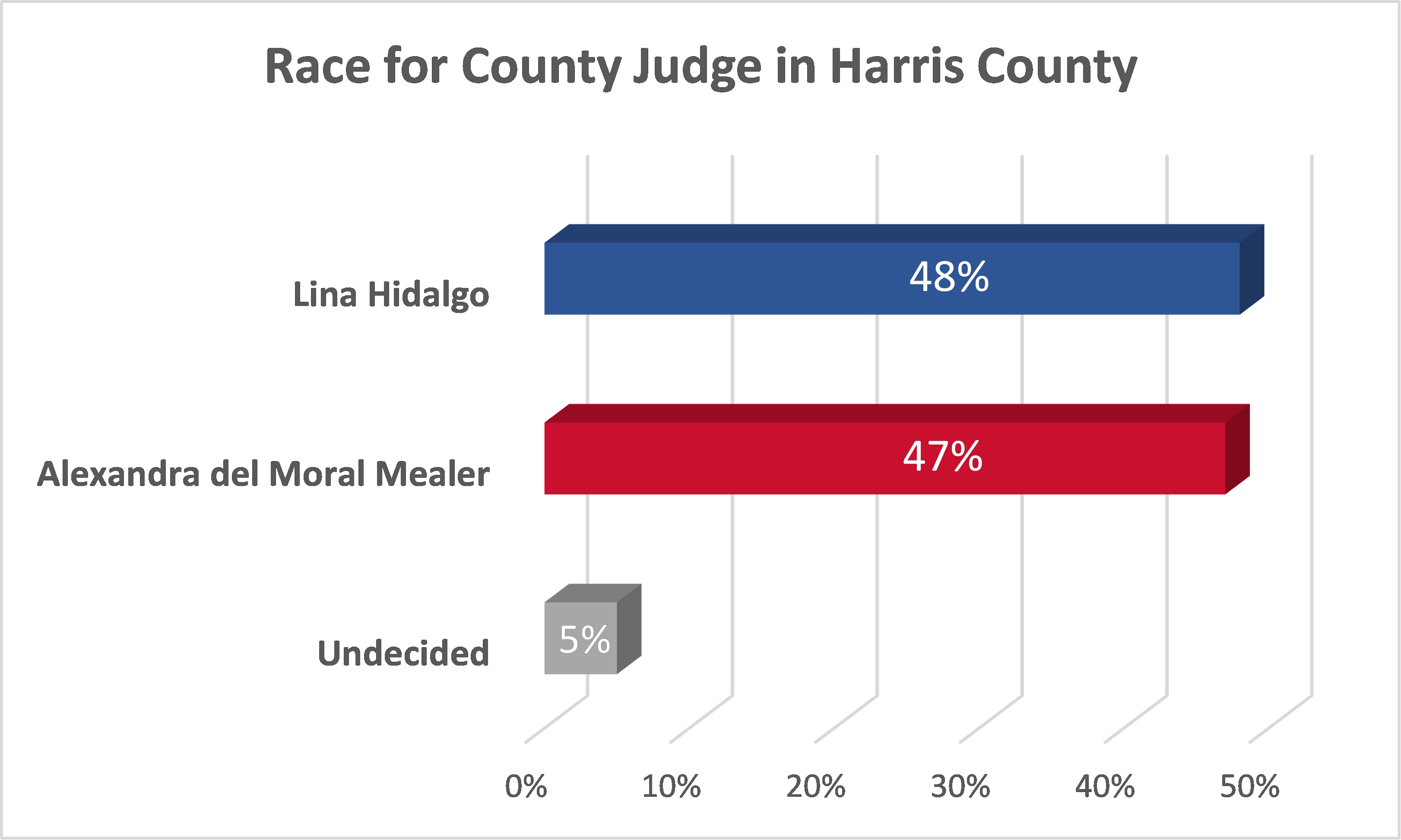
More than nine out of ten Hidalgo (94%) and del Moral Mealer (94%) voters are certain they will vote for Hidalgo and del Moral Mealer respectively in the fall.
Del Moral Mealer holds a 31% advantage over Hidalgo among white voters (64% to 33%), while Hidalgo holds a 66% advantage over Del Moral Mealer among Black voters (82% to 16%). Del Moral Mealer holds a 3% advantage over Hidalgo among Latino voters (47% to 44%).
Hidalgo holds a 14% lead over del Moral Mealer among women (55% to 41%), while del Moral Mealer holds a 13% lead over Hidalgo among men (54% to 41%).
Two out of 11 county-oriented policy issues stand out as being the most important to the county judge vote decision of Harris County’s likely voters. More than two-thirds of Harris County likely voters list crime and public safety (78%) and government corruption (72%) as being very important to their county judge vote decision. At a second level of importance are four issues considered to be very important to the county judge vote decision of more than half of Harris County voters: voting rights (59%), flooding (53%), election administration (53%), and property taxes (52%).
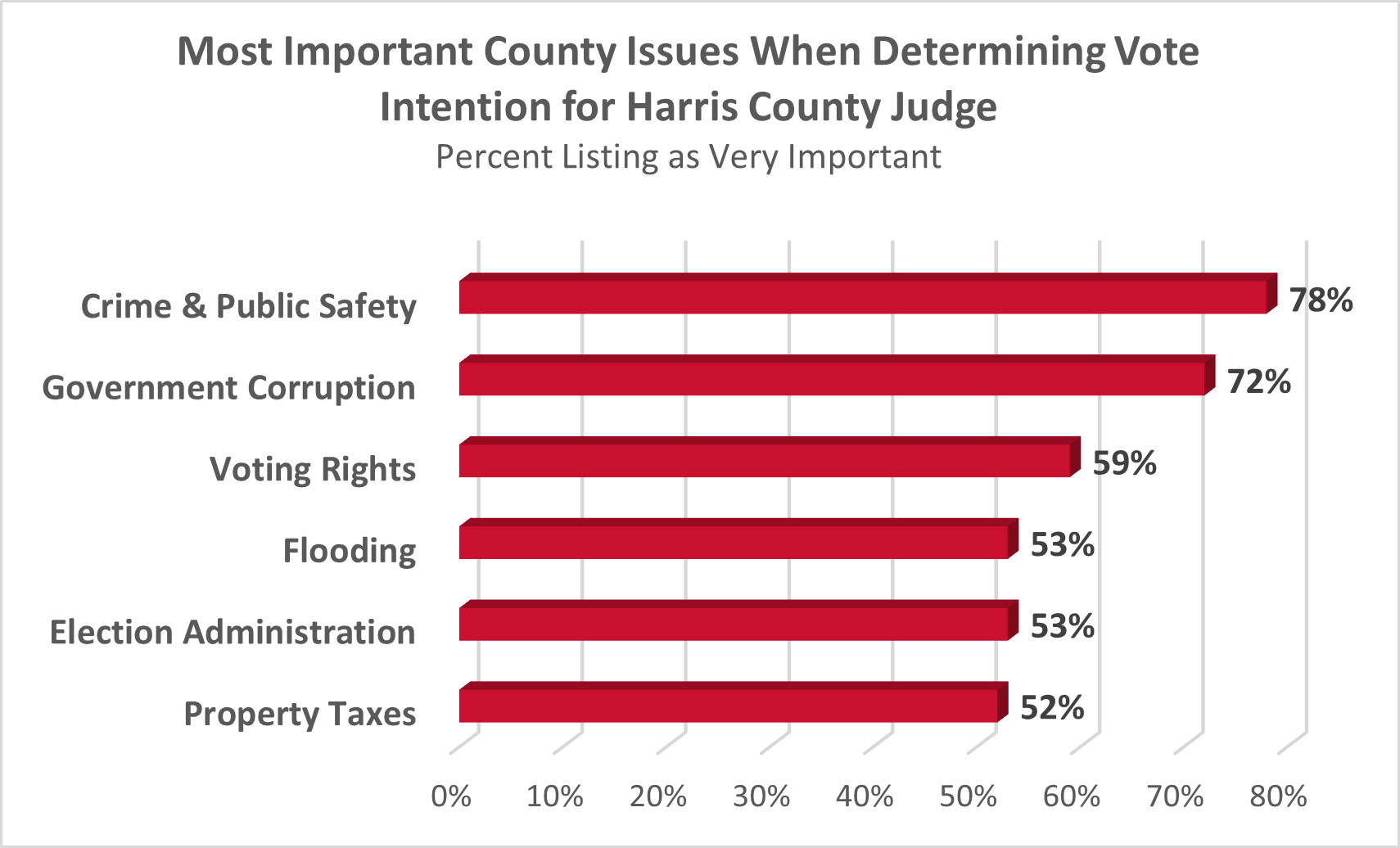
Of 10 Harris County elected officials and/or 2022 candidates, Democratic County Judge Lina Hidalgo is by far the best known, with only 9% of Harris County likely voters not knowing enough about her to have an opinion. Nearly half (49%) of Harris County likely voters have a favorable opinion of Hidalgo while 42% have an unfavorable opinion.
Slightly more than half (51%) of Harris County likely voters know enough about Alexandra del Moral Mealer, the Republican challenger in the county judge race, to have an opinion about her, while half (49%) do not. Among those with an opinion, 34% have a favorable opinion and 17% an unfavorable opinion.
After Hidalgo, the four best known political figures are District Attorney Kim Ogg (30% of likely voters don’t know enough about her to have an opinion), Precinct 2 County Commissioner Adrian Garcia (32%), Sheriff Ed Gonzalez (34%), and Precinct 1 County Commissioner Rodney Ellis (41%).
Of those with an opinion, Ogg is viewed favorably by 30% of Harris County likely voters and unfavorably by 40%, Garcia is viewed favorably by 39% and unfavorably by 29%, Gonzalez is viewed favorably by 41% and unfavorably by 25%, and Ellis is viewed favorably by 32% and unfavorably by 27%.
The four least well-known political figures (likely voters don’t know enough about them to have an opinion) are Precinct 4 challenger Lesley Briones (68%), Precinct 3 County Commissioner Tom Ramsey (67%), Precinct 2 challenger Jack Morman (66%), and Precinct 4 County Commissioner Jack Cagle (57%).
Read the report.
Report Three. Texas Policy & Politics 2022: Abortion Policy
Highlights
During the 2021 legislative session, the Texas Legislature passed House Bill 1280, which, in the event Roe v. Wade was overturned (as occurred in June 2022), would ban abortion in Texas except when the woman’s life was in danger.
- 50% of Texans oppose this new ban on abortion in Texas, with 42% in strong opposition.
- 46% of Texans support this new ban on abortion in Texas, with 26% strongly supporting it.
- 80% of Texas Democrats oppose this new ban (76% strongly).
- 76% of Texas Republicans support this new ban (44% strongly).
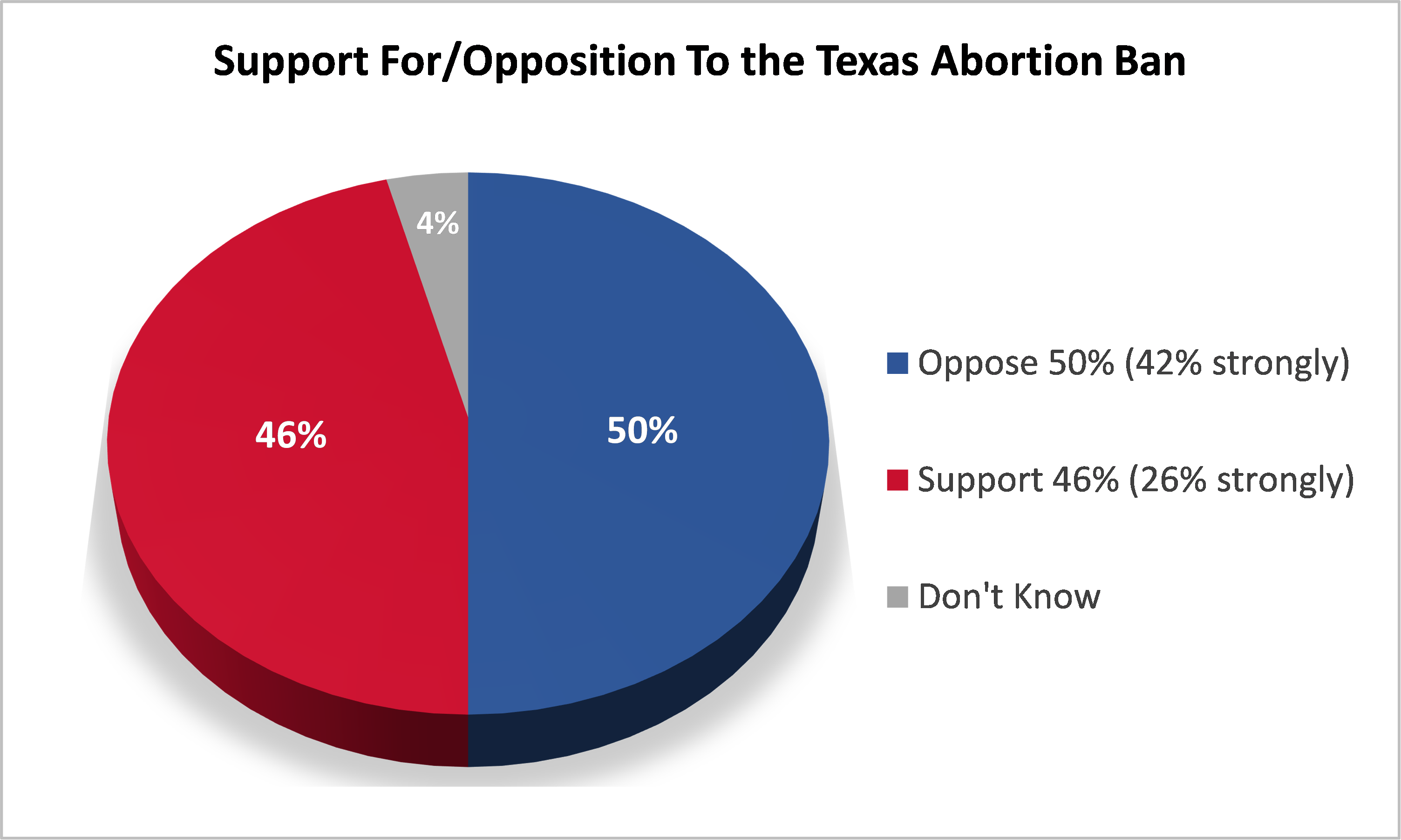
The Dobbs decision allows each of the 50 states to determine their own abortion policy. Survey respondents were presented with eight distinct policies and asked which is closest to their own preference for what abortion policy in Texas should be.
- The preferred abortion policy position of 77% of Texans is more permissive than House Bill 1280, the rule which will now be the law of the land in Texas following the Dobbs decision, which bans abortion except if the woman’s life is at risk.
- The preferred abortion policy position of 72% of Texans is more restrictive than what was previously permitted nationwide under the prior doctrines established by Roe v. Wade (1973) and Planned Parenthood v. Casey (1992).
A majority of Texans, ranging from 51-76%, support four potential future abortion-related policies:
- 76% of Texans support (56% strongly) continuing to allow the Morning After Pill (Plan B) as an emergency contraceptive in Texas, while 16% oppose.
- 51% of Texans support allowing organizations in Texas to seek and receive contributions to fund trips by pregnant women out of state to obtain an abortion, while 37% oppose.
- 59% of Texans oppose legislation that would classify abortion as homicide and allow prosecutors to bring homicide charges against a woman who ends her pregnancy, while 30% support.
- 60% of Texans oppose legislation that would make it a felony for woman in Texas to take an “abortion pill” obtained out of state to end an abortion (through 10 weeks), while 29% support.
An overwhelming majority of a broad cross-section of Texans supports a set of eight policies to be considered by the Texas Legislature in 2023 to help pregnant women, babies, and young children.
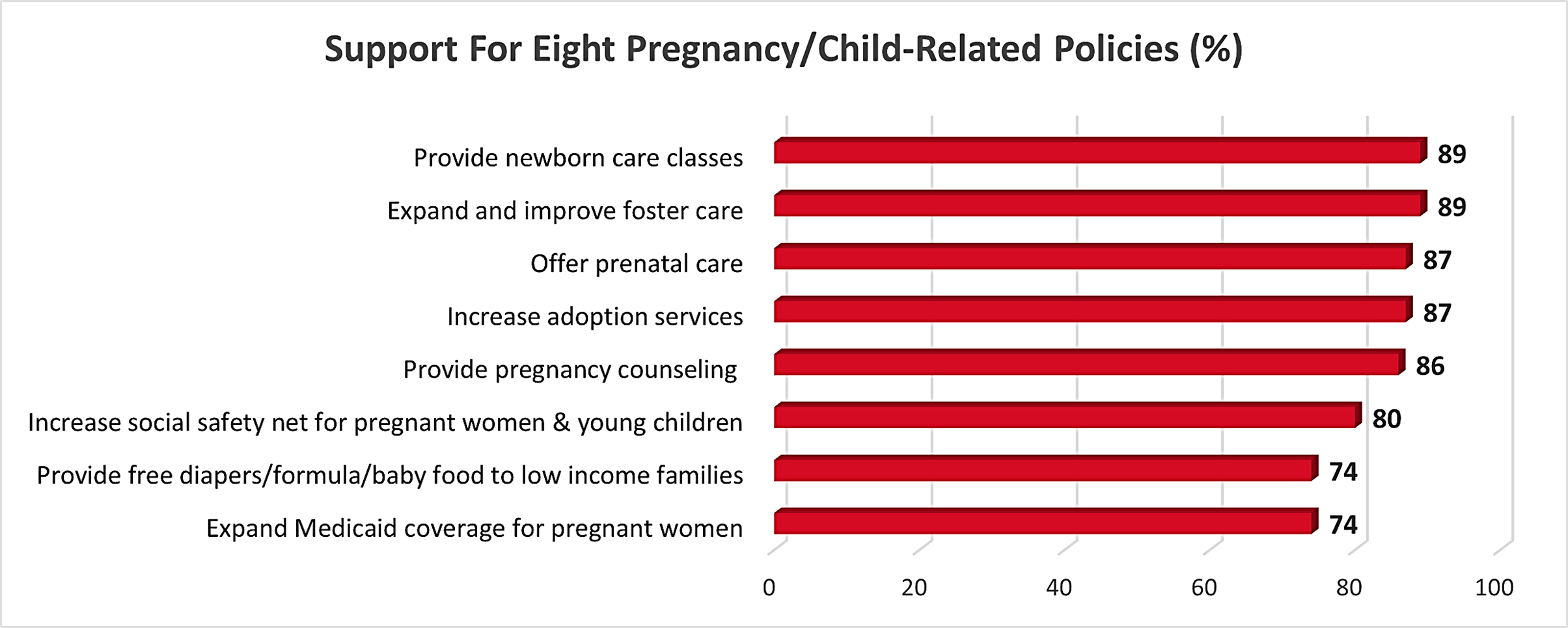
Read the report.
Media Release, July 19, 2022
Research Team
Renée Cross, Executive Director & Researcher, Hobby School of Public Affairs
Mark P. Jones, James A. Baker III Institute for Public Policy's Fellow in Political Science, Rice University; Senior Research Fellow, Hobby School of Public Affairs
Savannah Sipole, Research Associate, Hobby School of Public Affairs
Agustín Vallejo, Post-Doctoral Fellow, Hobby School of Public Affairs